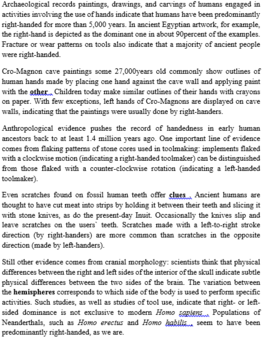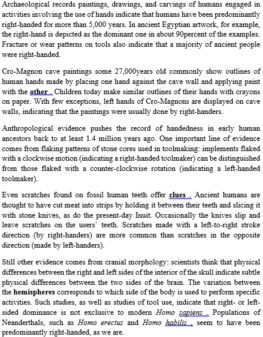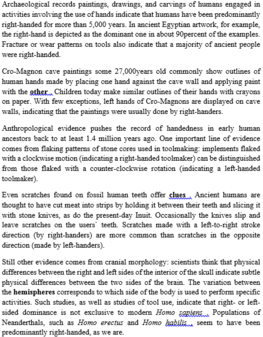Read the following passage and mark the letter A, B, C, or D on your answer sheet to indicate the correct answer to each of the questions from 36 to 42.
It is hard to get any agreement on the precise meaning of the term "social class". In everyday life, people tend to have a different approach to those they consider their equals from which they assume with people they consider higher or lower than themselves in social scale. The criteria we use to 'place' a new acquaintance, however, are a complex mixture of factors. Dress, way of speaking, area of residence in a given city or province, education and manners all play a part.
In ancient civilizations, the Sumerian, for example, which flourished in the lower Euphrates valley from 2000 to 5000 B.C. social differences were based on birth, status or rank, rather than on wealth. Four main classes were recognized. These were the rulers, the priestly administrators, the freemen (such as craftsmen, merchants or farmers) and the slaves.
In Greece, after the sixth-century B.C., there was a growing conflict between the peasants and the aristocrats, and a gradual decrease in the power of the aristocracy when a kind of ‘middle class’ of traders and skilled workers grew up. The population of Athens, for example, was divided into three main classes which were politically and legally distinct. About one-third of the total population was slaves, who did not count politically at all, a fact often forgotten by those who praise Athens as the nursery of democracy. The next main group consisted of resident foreigners, the, ‘metics’ who were freemen, though they too were allowed no share in political life. The third group was the powerful body of ‘citizens”, who were themselves divided into sub-classes.
In the later Middle Ages, however, the development of a money economy and the growth of cities and trade led to the rise of another class, the ‘burghers’ or city merchants and mayors. These were the predecessors of the modern middle classes. Gradually high office and occupation assumed importance in determining social position, as it became more and more possible for a person born to one station in life to move to another. This change affected the towns more than the country areas, where remnants of feudalism lasted much longer.
The word "criteria" in the first paragraph is closest in meaning to ________ .
A. characteristics
B. words
C. standards of judgment
D. criticisms






Đáp án C
Từ " criteria " trong đoạn đầu tiên có ý nghĩa gần nghĩa với:
A. đặc điểm
B. từ
C. tiêu chuẩn phán xét
D. phê bình